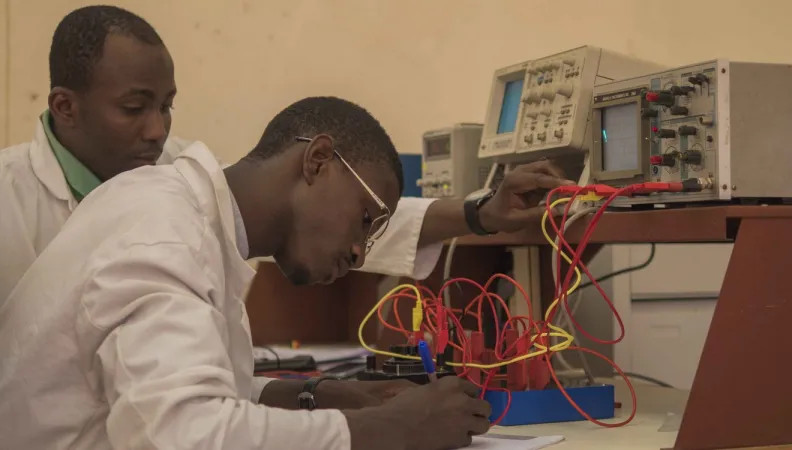Share the page
Third call for proposals for Academia Partnerships Africa-France projects: “Be creative, be original!”
Published on

How can we foster the construction of academia partnerships between Africa and France geared to contributing to countries’ sustainable development? Now that the third edition of the Academia Partnerships Africa-France (PeA) has just kicked off, a focus on feedback from the ETHIOPIE 4.0 project, funded under the second edition of the PeA.
Since 2020, the Academia Partnerships Africa-France (PeA) programme has been financing Franco-African academic partnerships working to develop job-oriented training programmes (Bachelor’s, Master’s and/or PhD) in economic sectors prioritised by the African partner countries. For the third edition’s call for proposals, open until 6 May 2025, Prof. Emmanuel Duc – project co-coordinator alongside Mr Getasew Taddese – shares with us his feedback on the ETHIOPIE 4.0 project, one of the winners from the previous edition. Stemming from a partnership between the Addis Ababa Institute of Technology in Ethiopia, and Clermont Auvergne INP in France, the project aims to structure a partnership-based programme around cutting edge technologies linked to Industry 4.0, to help boost the growth of this sector in Ethiopia.
See also: Artificial Intelligence, Data... How Can We Promote Equitable Technological Development?
What was the driver behind the ETHIOPIE 4.0 project and the building of the partnership between the Addis Ababa Institute of Technology (AAIT) in Ethiopia and the Institut National Polytechnique Clermont-Auvergne in France?
Emmanuel Duc: The project grew out of an initial collaboration between the two entities from 2019 to 2021 in the context of Mr Getasew Taddese’s thesis. His subject already dealt with the methodologies linked to Industry 4.0. While working on his thesis, Mr Taddese was better able to assess recent Industry 4.0 technologies and discover the French education system. He then thought it would be interesting to develop a training programme on this theme for the Addis Ababa Institute of Technology, to support Ethiopia’s industrial growth. We wanted to deepen this collaboration and give it an extra dimension to ensure its longer-term sustainability. When the PeA call for proposals appeared in 2022, we saw an opportunity to enhance our initial approach with more concrete challenges linked to robotisation or additive manufacturing. We wanted to share the technological achievements of our institution with our partner.
In 2022, what motivated you to respond to the PeA’s call for proposals?
We were motivated by two aspects. The first involved the sustainability of our relationship. The second was more basic. It concerned the level of technological development to provide to our partner in a globalised world, in which transporting goods has a high environmental impact. Value creation in Ethiopia depends on developing a clean local industry to meet local needs, and not on imports of consumer goods. This is why it is necessary to disseminate methods and techniques that can quickly build up a buoyant industry, while also minimising its carbon footprint. This means that creating a technological platform and modernising training material are paramount for the project.
The quality of your application file stood out, so would you have any advice to give those wishing to submit a project for the third PeA call for proposals?
Be creative and original! The PeA is an excellent opportunity to secure funds for projects or ideas that don’t fit into standard financing frameworks. It allows you to address training challenges in an international context. You soon realise that the approach is enriching not only for our African partner, as it makes us question and challenge our own teaching practices.
See also: Basic education: a Prerequisite for the Future
But careful! It also requires a strong commitment from the teams and, above all, it has to match a real need on our African partner’s side. The application file not only has to show a certain originality – even disruptive thinking and ambition –, but also be highly pragmatic when it comes to project implementation. In our project, the setting up of a 4.0 technology platform raises the question of what technological level is required to support Ethiopia in its technological breakthrough, while at the same time ensuring an excellent level of employability for students.
Since ETHIOPIE 4.0 was launched in September 2023, what key actions have been carried out thanks to the support of the PeA?
Our focus was to purchase and send equipment, which takes a long time. Currently, we are hosting several PhD students and several teachers in France to train them and prepare to send over new equipment. These exchanges mean we have entered a new, more active phase of collaboration. What’s more, the new training programmes have been developed and are now being assessed by the Ethiopian education authorities.
